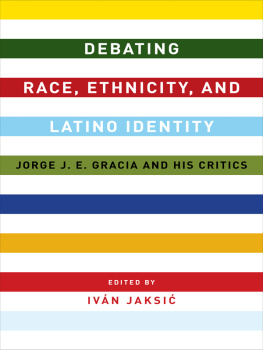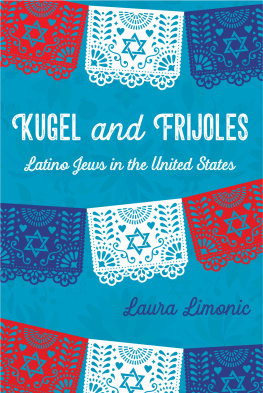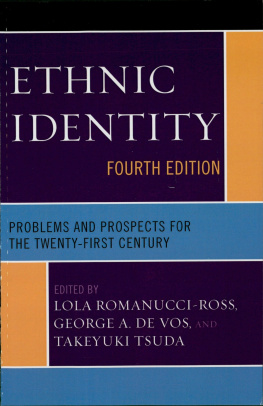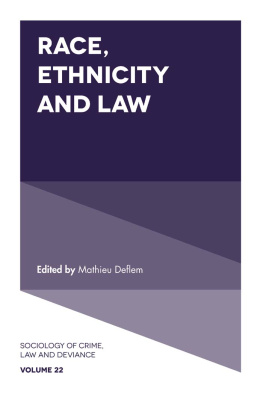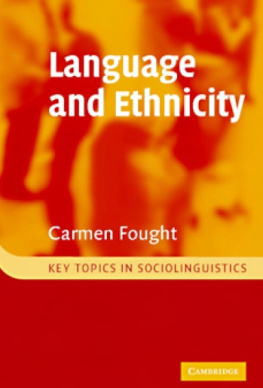DEBATING
RACE, ETHNICITY, AND
LATINO IDENTITY
DEBATING
RACE, ETHNICITY, AND
LATINO IDENTITY
jorge j. e. gracia and his critics
EDITED BY IVN JAKSI
COLUMBIA UNIVERSITY PRESS
New York
COLUMBIA UNIVERSITY PRESS
Publishers Since 1893
NEW YORK CHICHESTER, WEST SUSSEX
cup.columbia.edu
Copyright 2015 Columbia University Press
All rights reserved
E-ISBN 978-0-231-53772-8
Library of Congress Cataloging-in-Publication Data
Debating race, ethnicity, and Latino identity :
Jorge J. E. Gracia and his critics / edited by Ivn Jaksi.
pages cm
Summary: This book brings together some of the most prominent scholars in the philosophy of race and ethnicity in conversation about issues of ethnic and racial identity, nationality, and ethnic philosophy. The book contains the best defense by Jorge J. E. Gracia of his familial-historical view of Latino identityProvided by publisher.
Includes bibliographical references and index.
ISBN 978-0-231-16944-8 (cloth : acid-free paper)
ISBN 978-0-231-53772-8 (e-book)
1. Hispanic AmericansEthnic identity. 2. Hispanic AmericansRace identity. 3. Latin AmericansEthnic identity. 4. Latin AmericansRace identity. 5. Gracia, Jorge J. E.Political and social views. 6. Gracia, Jorge J. E.Philosophy. 7. EthnicityPhilosophy. 8. RacePhilosophy. 9. United StatesEthnic relations. 10. Latin AmericaEthnic relations. I. Jaksi, Ivn, 1954
E184.S75D42 2015
305.868'073dc23
2014049267
COVER DESIGN: CHANG JAE LEE
A Columbia University Press E-book.
CUP would be pleased to hear about your reading experience with this e-book at .
CONTENTS
Ivn Jaksi
Lucius T. Outlaw Jr.
Linda M. Alcoff
K. Anthony Appiah
Lawrence Blum
Jorge J. E. Gracia
J. L. A. Garca
Richard J. Bernstein
Robert Gooding-Williams
Gregory Pappas
Ilan Stavans
Eduardo Mendieta
Jorge J. E. Gracia
Renzo Llorente
Susana Nuccetelli
Mara Cristina Gonzlez and Nora Stigol
Howard McGary
Jorge J. E. Gracia
Jorge J. E. Gracia
The first decade of the twenty-first century has seen an unprecedented interest in, and development of, philosophical issues concerned with the intersection of race, ethnicity, and Hispanic/Latino identity. The exploration of race by philosophers goes back a relatively long way. Leaving aside the confusing and often biased notions put forward by the likes of Immanuel Kant and David Hume, authors such as Alain Locke and perhaps most of all W. E. B. Du Bois probed deeply into issues of race and racism in the eighteenth and nineteenth centuries. This was followed in the twentieth century by a plethora of work by black philosophers and philosophers of color, including Kwame Anthony Appiah, Bernard Boxill, Robert Gooding-Williams, Lewis Gordon, Leonard Harris, Bill E. Lawson, Howard McGary, Charles Mills, Lucius T. Outlaw Jr., Tommy Shelby, George Yancy, and Naomi Zack, and by white philosophers such as Robin Andreasen, Robert Bernasconi, Lawrence Blum, Joshua Glasgow, Sally Haslanger, Philip Kitcher, and Ron Mallon, to mention just a few of the most established, who have engaged the philosophy of race.
The exploration of ethnicity is connected to early discussions of race insofar as race and ethnicity have been thought to be closely related by some authors as early as Locke and Du Bois, although this has not been the norm. However, the first attempts at tying the philosophical discussion of race and ethnicity to Hispanic/Latino issues began in the nineties, with the work of Linda M. Alcoff, J. Angelo Corlett, and Jorge J. E. Gracia, who together with other philosophers interested in ethnic issues related to Hispanics/Latinos, such as Jos Medina, Eduardo Mendieta, Susana Nuccetelli, and Mariana Ortega, and I, among others, constituted a strong contingent. But it is at the beginning of the twenty-first century that this interest undergoes a substantial expansion with the publication of many books and articles, in part no doubt influenced by the demographic explosion of this ethnic group in the country and its increasing influence in American culture and politics.
This book tries to capture recent advances in the discussion of these issues by gathering important exchanges between Gracia and other prominent philosophers who have engaged him in dialogue. Gracia has been a leader in the philosophical discussion of these topics and has been at the center of many of the most important controversies surrounding race, ethnicity, and Hispanic/Latino identity.
The foundation for Gracias familiarity with these topics began with research on Latin American philosophy in the mid-seventies. This was helped by his personal friendship and collaboration with Risieri Frondizi, one of the most important Latin American philosophers of his generation, who acted as a mentor and partner to him. In Latin American philosophy, Gracia found some of the themes that he later explored and for which eventually he offered original theories and analyses. In collaboration with Frondizi, he compiled an anthology of philosophical texts from contemporary Latin American philosophers on the topics popular in the first half of the century, concerned with human nature and values: El hombre y los valores en la filosofa latinoamericana del siglo XX (1975, 1981). The editors intended to publish an English version of this volume, but given the American philosophical climate at the time, their efforts failed. Following this book, Gracia and I compiled a collection of texts in Venezuela (Filosofa e identidad cultural en Amrica Latina, copyright 1983 but published in 1988), and he edited a volume with Eduardo Rabossi, Enrique Villanueva, and Marcelo Dascal (Philosophical Analysis in Latin America, 1984; Spanish enlarged edition, 1985), a Festschrift in honor of Frondizi (Man and His Conduct: Philosophical Essays in Honor of Risieri Frondizi/El hombre y su conducta: Ensayos filosficos en honor de Risieri Frondizi, 1980), and a collection of Frondizis essays titled Ensayos filosficos (1986). In 1986 also Gracia published a substantially different version of El hombre y los valores, with the title Latin American Philosophy in the Twentieth Century: Man, Values, and the Search for Philosophical Identity, the first such work in English edited by a philosopher.
Encouraged by the publication of the anthology in English and the growing influence of the Hispanic/Latino population in the United States, Gracia convinced the board of the State University of New York Press in 1989 to begin a series devoted to the publication of monographs in the area of Latin American and Iberian Thought and Culture. The series was inaugurated with my book Academic Rebels in Chile: The Role of Philosophy in Higher Education and Politics (1989) and followed in 1993 by Ofelia Schuttes Cultural Identity and Social Liberation in Latin American Thought.
These events signaled that the field of Latin American philosophy was beginning to move and Hispanic/Latino demographics were helping, so that even the stodgy American Philosophical Association began to take notice. In 1991, Gracia became the founding chair of the associations Committee for Hispanics, an event that provided some impetus to the study of Latin American philosophy and Hispanic/Latino issues in the United States. Encouraged by these developments, Gracia published two groundbreaking books in 2000. Hispanic/Latino Identity: A Philosophical Perspective

